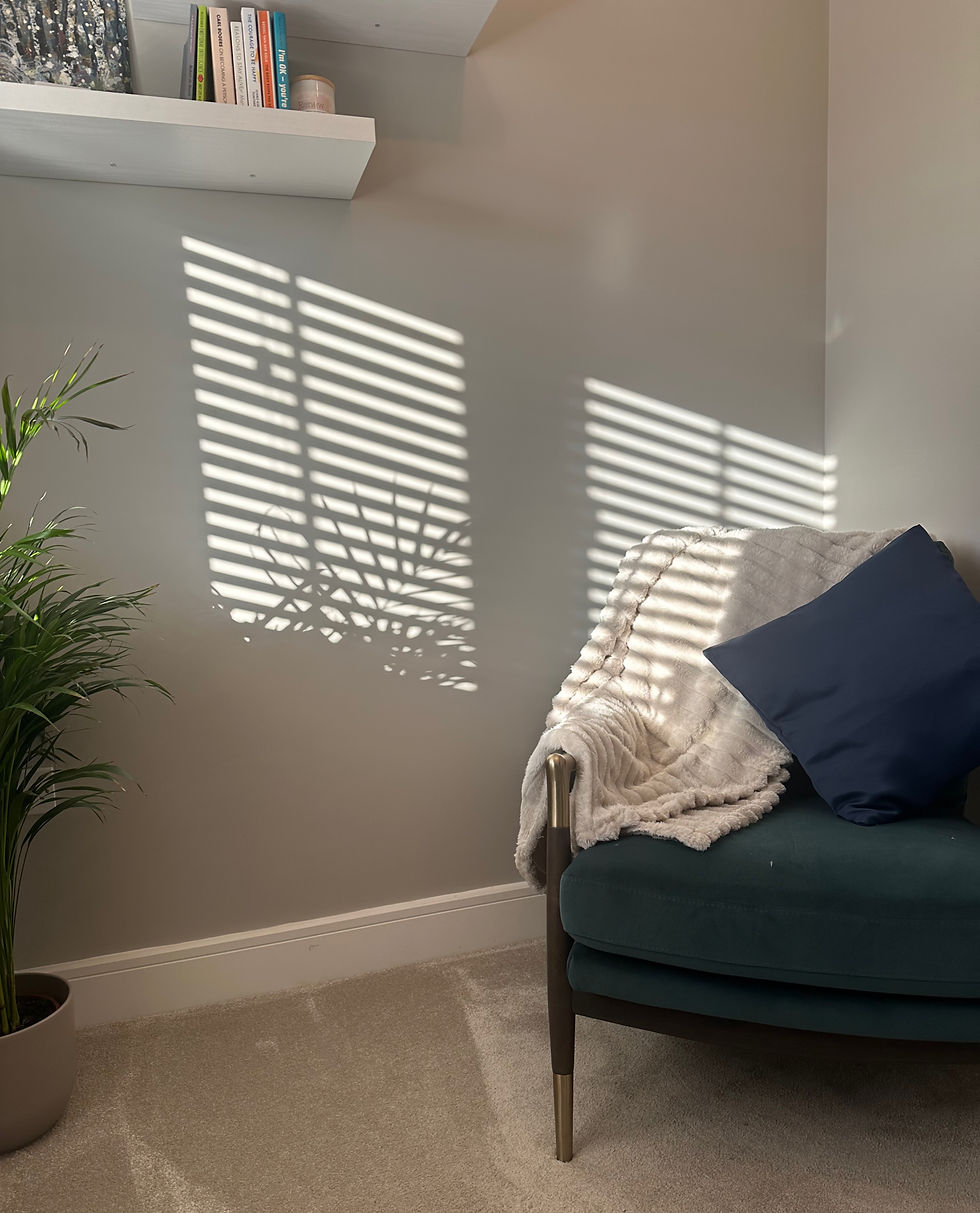You don't have to fix your anxiety to start feeling better
- Amy Griffin

- May 12, 2025
- 4 min read
Updated: Aug 1, 2025
If you’ve ever found yourself googling "how to stop anxiety forever" at 2am, welcome... you’re in good company. Anxiety can be loud, persistent, and incredibly convincing. It tells you there’s something wrong with you. That you need to figure it all out, fix it, and fast. But... here’s something I want you to hear - you don’t have to completely fix your anxiety to start feeling better.
I know that might sound a bit backwards, especially in a world that loves quick fixes and productivity hacks. But anxiety doesn’t work like a leaky tap or a dodgy app that just needs an update. It's more like a part of you that needs attention, not elimination.

Let’s talk about anxiety (The real kind)
First off, anxiety isn’t just a buzzword. It's a real emotional and physiological response that can affect every part of your life. Maybe it shows up as racing thoughts when you're trying to sleep. Maybe it makes your chest feel tight in the middle of a work meeting. Or maybe it’s that low-level hum of dread you carry around like a phone on 1% battery.
Common signs of anxiety include:
Overthinking and replaying conversations in your head.
Struggling to make decisions (even simple ones like what to have for lunch).
Feeling tense or restless.
Avoiding situations that feel overwhelming.
Worrying about things that haven’t even happened yet (and might never happen).
Sound familiar? You’re not alone. Anxiety is one of the most common mental health concerns, and yet it can feel incredibly isolating when you’re in it.
The myth of being “Cured”
We live in a culture that loves a solution. Got a headache? Take a tablet. Skin breakout? Here’s a 10-step skincare routine. Anxious? Just do some deep breathing and be mindful, right?
Well, sort of. While tools like breathing, mindfulness, journaling, or CBT techniques can help manage anxiety, the idea that we can banish it forever is a bit... unrealistic.
Anxiety isn’t something broken that needs fixing. It’s something human that needs understanding.
Sometimes anxiety is your nervous system trying to protect you based on past experiences. Other times, it’s your brain doing that thing it does best... imagining worst-case scenarios just in case. Either way, it’s not a flaw. It’s a signal.
You can still feel better (even with anxiety around)
Here’s the good news. You don’t need to be 100% anxiety-free to start feeling better in your day-to-day life. Letting go of the pressure to "fix" yourself can actually be the thing that helps you breathe again.
What if the goal wasn’t to get rid of anxiety, but to change your relationship with it?
That could mean:
Learning to notice your anxious thoughts without immediately believing them.
Creating space for self-compassion instead of self-criticism.
Talking to a therapist who helps you feel seen, not judged.
Finding ways to ground yourself when anxiety spikes (hello, cold water on wrists).
It’s about making anxiety less of a monster under the bed and more of a background character you know how to live with.
You are not your anxiety
When anxiety is loud, it can feel like it is you. Like it defines who you are. But it doesn’t. You are not your intrusive thoughts. You are not your panic. You are not your fear of conflict, your overthinking, or your habit of rehearsing texts 17 times before sending them.
You are a whole, complex, courageous human being doing the best you can.
Part of what makes therapy powerful is having someone who can sit with you in the anxiety without rushing to fix it. Someone who helps you get curious about it, rather than ashamed of it. That kind of space can be life-changing.
When to get support for anxiety
You don’t have to wait until things are "bad enough" to reach out for help. Therapy isn’t just for crisis moments. It can be a space to explore what’s underneath your anxiety, learn to understand it, and build a better relationship with yourself.
Some signs it might be time to talk to someone:
You feel constantly on edge or overwhelmed.
Anxiety is affecting your sleep, work, or relationships.
You’re avoiding things that matter to you because they feel too scary.
You’re tired of managing it all on your own.
Reaching out doesn’t mean you’re weak. It means you’re brave enough to say, "I want things to feel different."
You deserve to feel safe in your own head
Anxiety might still pop up now and then. That’s okay. But it doesn’t have to run the show. With support, self-awareness, and a good dose of gentleness (plus the occasional swear word if that’s your thing), things can feel lighter.
If you're looking for down-to-earth, warm, conversational therapy that doesn’t involve clinical coldness or awkward silences, I’m here. We can work together to help you feel more grounded, more empowered, and less tangled in anxious thoughts.
No fixing required. Just honest, real support.
Want to take the first step? I offer online and in-person counselling sessions for anxiety in Rayleigh, Essex (and beyond). You don’t have to go it alone.
You might have searched: anxiety support, therapy for anxiety, how to manage anxiety, anxiety symptoms, help for anxiety, overthinking, living with anxiety, counselling for anxiety, anxiety therapist, anxiety and relationships, anxiety self-help



Comments